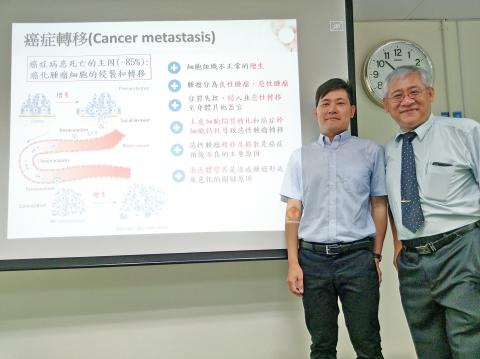Taiwanese researchers have become the first in the world to pin down a gene key to triggering metastasis of cancer cells, scientists at Academia Sinica announced yesterday.
The gene, known as paraspeckle component 1 — or PSPC1 — causes the metastasis of cancer in 60 percent to 70 percent of human patients, Jou Yuh-shan (周玉山), a research fellow at Academia Sinica’s Institute of Biomedical Sciences, told a news conference in Taipei.
In early-stage cancer, the condition affects only a localized part of the body, but when cancer spreads, the diagnosis changes to stage three or stage four, signifying that cancer cells are growing and spreading through blood vessels, he said.

Photo: Wu Liang-yi, Taipei Times
Stage three and stage four cancer is marked by the progression of cancer into other parts of the body, resulting in a deterioration of health and eventual death, he said.
After a decade of research, his team has identified PSPC1 as the gene that plays a crucial role in metastasis and controls the functions of other genes in cancer cells, such as inhibiting apoptosis, or natural cell death, he said.
Large-scale expression of PSPC1 is present in 60 percent to 70 percent of late-stage cancers, including breast, liver, lung and prostate cancers, he said.
PSPC1 not only augments the generation of cancer cells, but it also enables metastasis by imparting mobility and stem-cell like characteristics to normal cells, resulting in a superior growth rate and the drug resistance of cancer cells, he said.
Furthermore, the gene alters the cell’s cytokines to produce growth factor beta 1, also known as TGF-beta 1, which regulates apoptosis, he said.
In its altered state, the factor instead prolongs the lifespan and reproduction of cancer cells, he said.
The rate of PSPC1 expression is exceedingly low in healthy human beings, while high rates of its expression correspond with cancer that is reproducing and metastasizing, he said.
“In elucidating PSCS1 functionality and TGF-beta 1 behavior in metastasizing cancer, this research represents a major breakthrough,” Jou said.
The team’s study was published in the journal Nature Cell Biology on March 28.
The research team has identified an inhibitor of PSPC1 that has potential medical value, but its development for actual application in cancer treatment could take between 10 and 20 years, he said.

DAREDEVIL: Honnold said it had always been a dream of his to climb Taipei 101, while a Netflix producer said the skyscraper was ‘a real icon of this country’ US climber Alex Honnold yesterday took on Taiwan’s tallest building, becoming the first person to scale Taipei 101 without a rope, harness or safety net. Hundreds of spectators gathered at the base of the 101-story skyscraper to watch Honnold, 40, embark on his daredevil feat, which was also broadcast live on Netflix. Dressed in a red T-shirt and yellow custom-made climbing shoes, Honnold swiftly moved up the southeast face of the glass and steel building. At one point, he stepped onto a platform midway up to wave down at fans and onlookers who were taking photos. People watching from inside

A Vietnamese migrant worker yesterday won NT$12 million (US$379,627) on a Lunar New Year scratch card in Kaohsiung as part of Taiwan Lottery Co’s (台灣彩券) “NT$12 Million Grand Fortune” (1200萬大吉利) game. The man was the first top-prize winner of the new game launched on Jan. 6 to mark the Lunar New Year. Three Vietnamese migrant workers visited a Taiwan Lottery shop on Xinyue Street in Kaohsiung’s Gangshan District (崗山), a store representative said. The player bought multiple tickets and, after winning nothing, held the final lottery ticket in one hand and rubbed the store’s statue of the Maitreya Buddha’s belly with the other,

‘NATO-PLUS’: ‘Our strategic partners in the Indo-Pacific are facing increasing aggression by the Chinese Communist Party,’ US Representative Rob Wittman said The US House of Representatives on Monday released its version of the Consolidated Appropriations Act, which includes US$1.15 billion to support security cooperation with Taiwan. The omnibus act, covering US$1.2 trillion of spending, allocates US$1 billion for the Taiwan Security Cooperation Initiative, as well as US$150 million for the replacement of defense articles and reimbursement of defense services provided to Taiwan. The fund allocations were based on the US National Defense Authorization Act for fiscal 2026 that was passed by the US Congress last month and authorized up to US$1 billion to the US Defense Security Cooperation Agency in support of the

HIGH-TECH DEAL: Chipmakers that expand in the US would be able to import up to 2.5 times their new capacity with no extra tariffs during an approved construction period Taiwan aims to build a “democratic” high-tech supply chain with the US and form a strategic artificial intelligence (AI) partnership under the new tariffs deal it sealed with Washington last week, Taipei’s top negotiator in the talks said yesterday. US President Donald Trump has pushed Taiwan, a major producer of semiconductors which runs a large trade surplus with the US, to invest more in the US, specifically in chips that power AI. Under the terms of the long-negotiated deal, chipmakers such as Taiwan Semiconductor Manufacturing Co (TSMC, 台積電) that expand US production would incur a lower tariff on semiconductors or related manufacturing